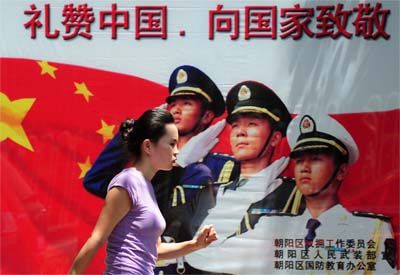For China, however, greater power and economic integration are effecting very profound changes, not just on the Chinese economy, but on Chinese society and government. At an economic level, the need to integrate with the region more closely than at any time since the early 15th century creates a new era of dependence which is masked by China’s apparent economic power.
It is certainly the case that China’s insatiable demand for resources and energy is making it a major regional and global trading partner. Many equate this with greater economic power, but buyers are rarely as strong as they seem. For example, 2,000 years ago Rome’s demand for grain made it a major force in the Mediterranean, but cut off from that grain Rome’s power collapsed within a generation while the rest of the Mediterranean was relatively unaffected.
Besides economics, China’s integration with the world is effecting changes in governance and government that have not been seen before. True, China remains largely an ethnically exclusive and coherent political entity. Power remains firmly in the hands of Han Chinese, and there is little risk of China fragmenting.
However, the way China is governed is changing as a result of its closer relations with the rest of the world. This is partly economic. We have already seen a change in economic management which will pave the way for even greater economic liberalisation, and economic democracy. As China’s capital markets deepen, insurance and superannuation replace state welfare, and investors and consumers gain more influence, the power of the bureaucrats will diminish.
This is mirrored in the gradual evolution of political decision making.
One can make the argument that, until recently, structurally little changed in China from the inauguration of the Imperial examination system in the Sui until its demise in the Qing. While the dynasties changed, China was consistently run as a Confucian bureaucracy. One can even generously characterise the excesses of the Cultural Revolution as a sort of confused Confucianism with guns. For thirteen centuries, bureaucrats made decisions and people were expected to follow them.
But China is slowly starting to grapple with popular participation in government (I refrain from describing it as democratic just yet), and certainly for the first time in 1300 years the bureaucracy alone no longer runs the economy. Moreover, the purposes of government are being questioned and changed, and this may be the most profound political and philosophical change in China since the brief flowering of neo-Confucianism during the Song.
As Zhu Xi wrote: ‘If one understands according to principle what ought to be, and takes it as his personal duty that it necessarily be so, then as for being furnished with rules and restrictions, what need will he have to wait for others to set them up in order to have something to follow and observe.’
Of course this was anathema to the continuation of a bureaucracy distinct in its aims from those of the common people. That is why the Shuyuan were suborned into becoming preparatory schools for the Imperial examination system, and suggestions of some sort of Chinese system of akin to what we know as natural law were gently discarded.
Now, though, China’s leaders are increasingly giving heed what people expect of their government. While many commentators are concerned about the continuation of the Communist Party, this is something altogether different, and more profound. In fact the Communist Party may continue for quite some time yet.
Crackdowns on corruption, the election of local officials, and a recognition of popular concerns about environmental standards are signs that the government is becoming more responsive to the people. This is a good thing, and the first true sign that China’s masses, no longer all starving and impoverished peasants, will have a say in shaping the direction of their country.
That would indeed be a profound change for China, and a sign that instead of changing the region, China has ended up changing itself.
William O’Chee was a Senator for the National Party in the Australian Senate from 1990 to 1999. He is currently a partner to Himalaya Consulting.

